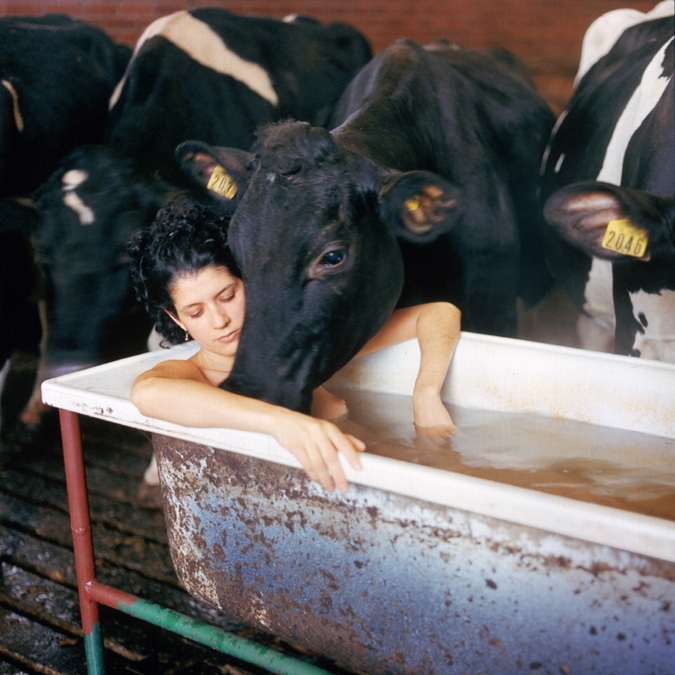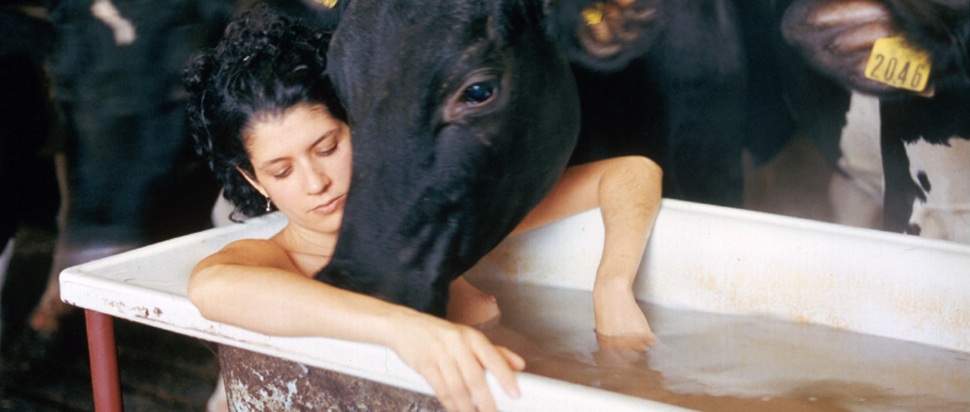Acts of Creation, and motherhood in the art world
This month, Acts of Creation: On Art and Motherhood, a Hayward Gallery Touring exhibition, arrives at Dundee Contemporary Arts (DCA). We talk to curator Hettie Judah on the importance of making space for motherhood in the art world
Can an artist survive the material and mental shocks of motherhood? How does creative practice fit with the repetitive, relentless demands of care-giving? What if we placed cultural value on mothers as makers rather than muses? These questions are at the centre of Acts of Creation: On Art and Motherhood.
Acts of Creation radically shifts the narrative around mothering and making art by turning away from the idealised iconography of mother and child typically depicted by male artists in Western art history and instead centring the messy, complex lived reality of motherhood. It’s an antidote to what Judah describes as a “failure of imagination to think that an artist might also be a parent or have caring responsibilities.” The result is a wide-ranging exhibition that brings together established and lesser-known artists working across a range of disciplines and mediums.
The first space that welcomes visitors to DCA is ‘The Temple’, with walls painted in the ultramarine shade of the Virgin Mary’s cloak. In this space, Judah counters depictions of the Madonna with a display of self-portraits that show motherhood as an ever-changing, unwieldy state of being. It can be raw, fleshy, intimate and awkward, as in Chantal Joffe’s Self-Portrait with Esme; or it’s a tentative balancing act between domestic chaos and the performance of a polished public self, as depicted in Billie Zangewa’s exquisite tapestry Every Woman. The images in ‘The Temple’ tap into one of the exhibition’s key themes: motherhood as a life’s work. “It felt important to honour the fact that motherhood doesn’t finish when you’ve weaned the baby,” Judah explains, noting it also encompasses a huge range of stages, such as parenting children with complex needs, supporting children as they become adults, or, as Barbara Walker’s Louder Than Words explores, the stress of raising Black sons in a society marred by structural violence and institutional racism.
For Judah, “one of the great joys of the show was to take a sideways look” at familiar works of art or familiar tropes through the lens of motherhood. Carrie Mae Weems’ iconic Kitchen Table series is represented here as a portrait of maternal ambivalence that tracks the moods of motherhood. Caroline Walker’s painting of baby feeding paraphernalia drying on a draining rack quietly subverts the still-life tradition by foregrounding the gruelling daily labour that goes into keeping a baby alive.

2038, 2000, by Janine Antoni. Image courtesy of the artist and Luhring Augustine, New York
Motherhood can also mean loss or the decision not to mother. Tracey Emin’s Something’s Wrong sits alongside works from Paula Rego’s powerful Abortion Series to consider the complexities of abortion, as a choice that can be painful, empowering – or both. One of the great strengths of Acts of Creation is the attention and importance it attributes to the rich diversity of experiences that aren’t always acknowledged as part of motherhood, including abortion, infertility, and the creation of, in Judah’s words, “queer family constellations.”
In the wonderfully expansive text that accompanies the exhibition, Judah notes exhibiting artist Su Richardson’s despair at taking part in another show that champions artist mothers, decades after her participation in Feministo’s 1977 touring exhibition Portrait of the Artist as a Housewife: “In another 50 years, will we be doing this again?” How does Judah think we break this cycle? “You tend to get patterns of failure to make things more accessible and accountable” in large public institutions and commercial galleries, where, Judah suggests, there can be an attitude of “that’s just how it is [here]”. But there are reasons to be hopeful. In Scotland, Judah cites the National Galleries of Scotland’s acquisition of Caroline Walker’s monumental painting Theatre, DCA’s shift to working arrangements that accommodate caring responsibilities, and the work of Spilt Milk Gallery as evidence of changing attitudes to motherhood in the art world.
Judah feels that actively engaging audiences is also vital to this work. Continuing the legacy of the women’s movement’s mantra that the personal is political, Judah wants visitors to activate the exhibition space through hands-on participation. “I’d love it if people felt they had the license to come and interact with the show,” she says, inviting them to breastfeed, peel potatoes, or fold laundry at the communal kitchen table that forms part of the show.
In Acts of Creation, Judah challenges us to examine our role in vital networks of care, at a time when it’s becoming impossible for anyone to ignore the fact that the body is a key battleground in the fight for a fair future. It’s a bold exhibition that shows making space for mothering and care – in all its messy, brutal, beautiful glory – is something that should concern us all.
Acts of Creation: On Art and Motherhood, Dundee Contemporary Arts, Nethergate, Dundee, 19 Apr-13 Jul, free
